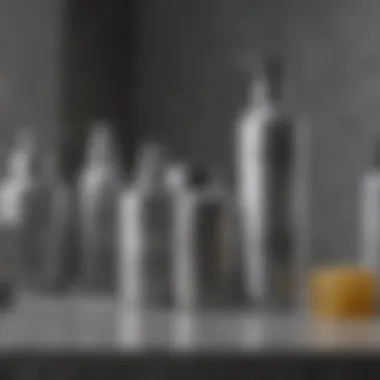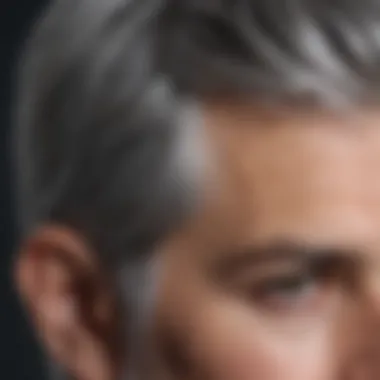Expert Hair Care Tips for Beautiful Grey Hair


Intro
Caring for grey hair demands attention and distinct strategies. Unlike youthful locks, silver hair often presents unique challenges. From texture changes to the transportation of color, understanding these factors plays a pivotal role in establishing an effective regimen.
As grey hair ages, it can become more coarse and less vibrant. Incorporating the right hair care products makes a substantial difference. In this comprehensive guide, we will delve into specific products, routine designs, and methods that enhance the beauty and health of grey hair. The aim is to empower readers with knowledge that complements their unique styles and grooming rituals.
Understanding Grey Hair
Grey hair results from the natural aging process when pigment-producing cells in the hair follicles gradually diminish. This transition can lead to a transformation in hair structure, making it feel different and appear thinner. Not only does pigmentation lessen, but the hair may also become weaker. Additionally, lifestyle factors, stress, and environmental aggressors can contribute to this change.
The importance of tailored care cannot be overstated. Namely, utilizing moisturizing shampoos and conditioners can ensure softness while protecting against brittleness. It is also advisable to make regular scalp treatments a part of your hair care routine. These adjustments can positively impact hair overall quality.
Product Choices for Maintaining Grey Hair
Selecting products designed specifically for grey hair can boost texture and shine. Look for sulfate-free shampoos. These help to maintain moisture without stripping natural oils. Conditioners rich in nourishing ingredients, like argan oil or keratin, are essential for hydration.
Here is a short list of effective products:
- Nioxin Cleanser: Helps to cleanse while maintaining moisture.
- Kevin Murphy Hydrate-Me Wash: A sulfate and paraben-free shampoo that promotes shine.
- L'Oréal Professionnel Serie Expert Silver Shampoo: Maintains brightness and tackles brassiness.
- Moroccanoil Treatment: Styles and hydrates efficiently, adding gloss.
Using these or similar products tailored to grey hair only heightens its potential. Choosing hair styling creams or leave-in conditioners designed for similar goals can deliver results.
Hair Care Techniques for Grey Hair
Routine handling also plays a crucial role. Here are some systematic practices to uphold:
- Gentle Washing: Limit frequency to preserve natural oils. Consider washing every two to three days.
- Heat Protection: Utilize a heat-protective spray beforehand any style routine. This minimizes thermal damage.
- Regular Trimming: Trims every six to eight weeks minimize split ends and maintain a polished appearance.
- Deep Conditioning: Industry-recommended once a week. Intensive treatments replenish moisture effectively.
All combined, these practices contribute to long-term health. They allow grey hair to function well while maintaining a stylish look. Remember that grey hair should not detract from overall grooming, but can in fact assert one’s unique style.
Finale
To manage grey hair effectively, a dedicated approach to both products and everyday practices illuminates the uniqueness of silver locks. Therefore, promoting brightness, strength, and overall health guide an elegant transition into grey styling. With the right understanding and tools, you can embrace your heritage smoothly and stylishly.
Understanding Grey Hair
Understanding the phenomenon of grey hair is essential for anyone seeking to maintain their hair's health and appearance as they age. Grey hair is often seen not only as an indication of aging but also as an opportunity for personalization and style. This section explores the intricacies of hair graying, as well as various cultural perspectives, to provide a comprehensive view of what grey hair represents.
The Science Behind Hair Graying
Grey hair occurs due to a combination of genetic, environmental, and biological factors. Hair color is determined by melanin, produced by melanocytes located in hair follicles. As individuals age, melanocyte activity declines, leading to decreased melanin production. This results in hair gradually losing its color. Genetics play a pivotal role in when hair begins to gray; some might experience it in their twenties, while others may not see the first signs until later in life.
Additionally, oxidative stress can contribute to the aging process of hair. The body produces free radicals, which can damage cells, including melanocytes, accelerating the graying process. Other contributing factors can include a poor diet, excessive sun exposure, and certain medical conditions. Notably, nutritional supplements, including vitamin B12 and biotin, have also been suggested to influence hair health positively, although more research is needed in this area.
The process of hair graying involves a decline in melanin, ultimately leading to the transformation of vibrant colors into shades of grey and white.
Cultural Perspectives on Grey Hair
The perception of grey hair varies widely across cultures. In some societies, grey hair is a symbol of wisdom and experience. Here, it carries a certain mystique, earning individuals respect and admiration. Asian and African cultures often celebrate its significance, seeing it as a badge of honor that reflects one's life journey.
Conversely, in many Western cultures, grey hair can be viewed unfavorably, associated with aging and decline. These perceptual differences significantly impact how individuals approach grey hair maintenance and styling. Some may opt for hair dye to conceal grey strands, while others embrace the silver look as an authentic expression of one's identity.
Challenges of Grey Hair Care
Caring for grey hair is not merely an aesthetic choice; rather, it presents specific challenges that must be understood and addressed intelligently. The complexities of grey hair, such as its texture, color management, and issues related to dryness and fragility, are key considerations in crafting an effective hair care routine. Recognizing these aspects provides a solid foundation for making informed decisions regarding products and styling techniques.
Texture Changes
As we age, our hair undergoes texture changes that can become evident when greying begins. Grey hair often feels different compared to its pigmented counterpart. It may become courser, thicker, or even wiry. These shifts can make styling more challenging. Taking note of these texture changes can help in choosing the right products to maintain manageability and softness. Individuals often find that hydrating shampoos and conditioners, specifically designed for grey hair, can nourish the fibers more effectively than standard products. Choosing alternatives that emphasize moisturization is a crucial first step in tackling the effects of aging hair.


Color Management
Color management is an equally pressing concern for those with grey hair. Even with a full head of silver strands, maintaining a bright and polished appearance demands continual effort. Grey hair can carry a yellowish tint over time, requiring the use of appropriate color correctors and toners. Regularly using purple shampoos can fight this issue. It is important to adopt a regimen tailored to counteract undesired hues while enhancing the overall luster of the hair. Understanding that this step is essential can lead to a significant improvement in the overall impression one gives off.
Dryness and Fragility
Dryness and fragility are critical issues fronted by many individuals sporting grey hair. As hair loses its natural oils over time, it tends to lose moisture, leading to a brittle feel that is unpleasant and damaging. Styling practices usually contribute to these characteristics, which can lead to breakage. It is vital to employ products that explicitly address these concerns by enhancing hydration and strength. Incorporating serums or oils rich in vitamins can offer the required restorative properties to combat this fragility.
Regularly assessing these challenges will empower one to adopt a more informed approach in hair care. It leads to products and practices designed specifically for grey hair needs.
This section highlights the key challenges one faces in managing grey hair. Adopting various methods to tackle texture changes, manage color effectively, and remedy dryness positions individuals to embrace their hair confidently. Addressing these challenges is quintessential in maintaining both health and attractiveness.
Products Specifically for Grey Hair
The care of grey hair requires specific products designed to address its unique characteristics. As hair turns grey, the structure and pigmentation change, necessitating a tailored approach to care. Utilizing the right products can enhance the overall health, manageability, and aesthetic appeal of grey hair. This section highlights the significant role certain products play in maintaining the beauty of grey locks.
Shampoos and Conditioners
Shampoos and conditioners formulated specifically for grey hair take into account the hair's distinctive needs. Many grey hair shampoos are designed to counteract yellowing and enhance silver tones. It is common for grey hair to become dry and lack vibrancy due to the absence of natural oils. Therefore, looking for moisturizing shampoos that include ingredients like argan oil, coconut oil, or shea butter is essential. These moisturizers nourish and restore moisture, leading to softer and shinier hair.
When selecting a conditioner, it benefits to have ones that are rich in amino acids. They help reconstruct damaged strands and promote resilience. Regular use of these products allows grey hair to remain pliable and minimize the potential for breakage. One effective approach is the combination of a purple shampoo with a hydrating conditioner for those wanting to keep their 'cool' values intact.
Recognizing hair type is also crucial. Whether your hair is fine, thick, or wavy dictates which product best suits the individual. Therefore, testing and personalizing can lead to the optimum grooming routine.
Hair Oils and Serums
Hair oils and serums present a vital part of a grey hair care regimen. These products serve multiple purposes, such as hydration, shine enhancement, and heat protection. Ingredients like jojoba oil, argan oil, and vitamin E oil are beneficial in treating dryness. When applied, these oils can penetrate the hair shaft to restore essential lipids that grey hair tends to lose.
Serums, on the other hand, can create a protective barrier against environmental stressors. These products are particularly effective for frizz control and managing any texture disparities that arise as hair ages. For daily application, consider light oils ahead of styling or hydration serums after heat exposure; both methods improve overall hair quality.
It's advisable to perform patch tests to check for allergies and also to know the amount suitable for application. Users may wish to warm the oils slightly before application to increase absorption.
Color Correctors and Toners
Color correctors and toners specifically for grey hair play a significant role in fine-tuning color balance and enhancing brightness. Purple tones, for example, can neutralize unwanted yellow hues, which is common as grey hair tones shift. It often becomes warmer or duller over time, a weary result from daily wear-and-tear or exposure to pollutants.
Showing the way to create vibrant yet sophisticated looks, toners ease the transition as aging occurs. Utilizing a color corrector during your wash routine can strikingly improve the radiant luster of grey hair. A treatment application every few weeks keeps grey in its best form.
When integrating these products into a hair care routine, ensure adequate recommendations according to the brand and type of hair. Understanding how often to apply toners or color treatments will only enhance both confidence and style.
Hair requires special attention, irrespective of the paradigms often prescribed by society. Appropriate care ensures that grey hair can be a point of style and not viewed solely as an aging marker.
In nurturing grey hair, a firm grasp of product differentiation guarantees optimal outcomes, empowering men into fashion and stylistic expression provided by their hair.
Daily Routine for Grey Hair
Caring for grey hair requires a thoughtful approach, particularly when establishing a daily routine. The right daily habits can enhance the look of your silver locks and maintain their health. Grey hair tends to be inherently drier and more prone to breakage, hence the need for a meticulous routine is paramount. By focusing on a structured regimen, you can achieve optimal management, improving not just the appearance but also the texture of grey hair.
Washing Frequency
Determining the ideal washing frequency is a fundamental aspect of any hair care routine. For grey hair, too frequent washing can strip natural oils. This often leads to increased dryness and unmanageable texture. It is advisable to wash your hair two to three times a week. Use a sulfate-free shampoo formulated for grey hair, as it can help retain moisture and prevent further drying without eliminating necessary oils. Additionally, when washing, be sure to use lukewarm or cool water, which is gentler and helps to lock in moisture.
Detangling Techniques
After washing, the next essential step is to handle detangling with care. Grey hair can be more susceptible to tangling and tangles can cause breakage if not addressed properly. Using a wide-toothed comb while the hair is damp can significantly minimize snags. Start from the tips and gradually work your way up; this method lets you remove tangles without excessive pulling. Consider using a leave-in conditioner or detangling spray specifically designed for grey hair. These products can create slip that helps the comb glide through strands effortlessly.
Styling Practices
Finally, the styling practices you choose are crucial to preserve the health of grey hair. Opt for minimal heat styling. When you do use heat tools, always apply a heat protectant spray beforehand to guard against damage. Consider scrunching or air-drying your hair rather than blow-drying, as styling tools like curlers and irons may contribute to dryness.


For grey hair, embracing its natural texture can often lead to more manageable styles. Utilizing products that offer nourishment and definition become essential in retaining both style and health. In addition, regular trimming helps keep gray hair looking fresh and prevents split ends.
A consistent daily routine paired with the right products can transform how grey hair feels and looks. Improved health reflects not only in the shine but also in the confidence it impart.
By paying attention to washing frequency, detangling techniques, and styling practices, you can create a tailored daily routine that elevates the health of grey hair efficiently.
Nutritional Aspects for Healthy Hair
Caring for grey hair goes beyond external treatments and products. Nutritional aspects play a vital role in maintaining the overall health of hair, particularly as it begins to lose color and texture. A proper diet can enhance the condition of grey hair, improve its appearance and resilience, and support its natural vitality. Understanding the essential vitamins and minerals can serve as the foundation for a tailored dietary approach.
Essential Vitamins and Minerals
For grey hair, the right mix of vitamins and minerals ensures optimal nourishment. Key nutrients include:
- Vitamin B12: Essential for red blood cell production, it helps maintain hair pigmentation. A deficiency can also lead to hair loss.
- Biotin: This vitamin strengthens hair and supports new growth. It is often included in supplements for healthier looking hair.
- Vitamin D: Contributes to hair follicle cycling and health. Research suggests that a lack of Vitamin D could lead to thinning hair.
- Iron: Important for oxygen transport in the body, ensuring dermal papilla cells receive sufficient nutrients.
- Zinc: Plays a role in hair tissue growth and repair, maintaining functionality of oil glands.
These nutrients not only help with grey hair but also benefit hair in general, regardless of color.
Dietary Recommendations
To optimize hair health, consider the following dietary recommendations:
- Incorporate protein-rich foods:
- Include antioxidants:
- Stay hydrated:
- Healthy fatty acids:
- Balance diet with whole grains:
- Eggs, lean meats, legumes, and dairy products raise protein levels. Hair, being composed predominantly of keratin, needs ample protein for growth and repair.
- Fruits and vegetables like berries, spinach, and carrots have antioxidants that help combat oxidative stress, protecting hair follicles.
- Drinking enough water is fundamental. Hydration supports not just hair but overall body function, leading to luminous skin and strong hair.
- Opt for foods high in Omega-3 fatty acids like fish, walnuts, and flaxseeds. These help retain moisture and manage dullness.
- Whole grains deliver essential vitamins and minerals, such as iron and zinc. They are much more nourishing than refined grains.
A balanced diet full of crucial nutrients contributes significantly to the vitality and health of grey hair.
By integrating these dietary tips into one's routine, one can acutely affect the health of grey hair, leading not only to improved manageability and appearance but also to maintaining confidence in embracing the graying process.
Professional Treatments for Grey Hair
Professional treatments play a vital role in the overall care of grey hair, especially as it requires distinct approaches compared to younger hair. The evolving texture, color vibrancy, and moisture retention needs of grey hair can benefit from specialized services that keep hair looking its best.
Using professional treatments can deeply nourish the hair. Hairdressers are trained to understand the unique challenges presented by grey strands, and this insight allows them to choose the most effective treatments tailored to each individual's hair condition. Furthermore, professional treatments can often yield quicker, more dramatic results than at-home care.
Color Treatments
Color treatments specifically designed for grey can bring back the vibrancy that sometimes fades with aging hair. These treatments can be classified into various methods: semi-permanent, permanent hair colors, and highlights.
Semi-permanent colors don't penetrate deeply; however, they can blend grey, producing a softer look. Weaves of highlights enhance contrast and add depth. Permanent colors offer full coverage but might damage if not done properly. Consult with a professional stylist who understands the subtleties micro-pigment can hold in grey.
Considerations include:
- Frequency of treatments: Depending on your natural hair growth.
- Type of product used: Ammonia-free products minimize damage.
- Desired look: Matching grey hair tones to new colors attractively.
Using unavoidable techniques like balayage provides a modern aesthetic to grey hues, keeping your hair looking stylish and fresh.
Deep Conditioning and Moisturizing Procedures
Deep conditioning not only repairs damage but also restores moisture to dry, brittle grey hair. Professional-grade conditioners and treatments, such as Olaplex or K18, penetrate deeply, reconnecting broken hair bonds and revitalizing lifeless hair.


Regular visits for conditioning treatments are beneficial. These treatments produce higher levels of hydration than standard home products. Many service providers offer customized options, including masks that incorporate rich oils such as argan or jojoba, effective in coating strands.
In this proces, you can ensure that the stylist tailors the procedure according to your hair porosity and existing damage, securing substantial results.
Scalp Treatments
Healthy hair starts with a healthy scalp. Specific scalp treatments enhance the environment for hair growth and minimize issues often associated with aging, such as dandruff or sensitivity.
Typical treatments can include light exfoliation followed by specialized masks. Ingredients like tea tree oil are effective against dryness or itching. Balms that use clay and seaweed extract help in detoxifying the scalp, promoting blood circulation, which in turn nourishes your hair follicles.
One notable thing to remember is that the scalp requires attention just like the hair. Prioritize consultations with professionals to determine any existing scalp conditions that necessitate attention.
Regular maintenance can lead to healthier and younger-looking hair.
Investing in professional treatments for grey hair can ensure care that meets your unique needs, allowing for a graceful and stylish aging experience.
Consideration of Lifestyle Factors
The overall lifestyle significantly influences hair health, especially for those with grey hair. Each component plays a vital role in how hair looks and feels. From reducing emotional stress to protecting hair from harmful UV rays, these considerations contribute to maintaining the quality and appearance of grey hair.
When discussing lifestyle factors in relation to grey hair, important elements like stress management and sun protection stand out. Both of these factors anchor one's daily routines yet are often overlooked in hair care trends.
Stress Management
High levels of stress can negatively affect your hair. When dealing with stress, the body's natural responses can lead to hair loss or changes in hair quality. Grey hair, in particular, can be more susceptible to the damaging impact of stress-related factors. Adequate methods to manage stress include regular exercise, meditation, or engaging in hobbies that bring joy. In addition, mental well-being directly translates to physical health, making self-care essential.
Emphasizing stress relief techniques not only fosters overall well-being but also can lead to an improved relationship with one's grey hair. Prioritizing relaxation promotes a healthier scalp, which in turn helps to maintain vibrant grey locks.
Some effective strategies for stress management:
- Mindfulness practices, such as meditation, can clear the mind of anxieties.
- Regular dynamic exercise invigorates not just the body, but also the scalp.
- Nurturing social connections sheers off burdens, providing an extra layer of peace.
Sun Protection
Exposure to UV rays adversely affects hair health. For individuals boasting grey hair, this issue becomes paramount. Grey hair, being often coarser and drier, tends to show damage more readily than dark hair. Without adequate sun protection, this can lead to a lack of luster, increased fragility, and accelerated aging.
Incorporating sun protection into your routine strengthens the defense against harmful rays. There are several ways to shield grey hair from UV damage:
- Wear a wide-brimmed hat during prolonged outdoor activities.
- Use hair products containing SPF, specifically designed to safeguard your hair from sun exposure.
- Limit direct sun exposure, especially during peak hours from 10 AM to 4 PM.
Taking care of one's lifestyle by emphasizing aspects such as stress management and sun protection can create a formidable defense for grey hair. With careful reflection and diligent application, the pursuit of healthy and vibrant grey hair becomes less a challenging endeavor and more an achievable goal.
Closure
Caring for grey hair often presents challenges. It requires proper understanding and maintenance to ensure it looks healthy. Grey hair can signal wisdom, but it also might evoke insecurities regarding its appearance. This article presents strategies to boost self-confidence while managing this evolving aspect of personal grooming.
Maintaining Confidence with Grey Hair
Confidence in appearance remains essential for men aiming for style sophistication. Embracing grey hair can contribute to a strong persona. Acknowledging physical changes brings acceptance.
Consider the following:
- Positive Mindset: Shift focus from the changes in hair color to the experiences you gain through time.
- Grooming Practices: Utilize quality products aimed at freshening up grey tones. This includes color-correcting shampoos, which can refresh the shade of your hair. Maintain regular trims to keep the hair neat, making it look well-kept.
- Styling Options: Explore different hairstyles that highlight grey hair. Certain styles can diminish a harsh look and accentuate gentler features of your personality.
- Wardrobe Coordination: Dress to reflect confidence. The right clothing can complement your grey locks, emphasizing your fashion insight.
Grey hair requires maintaining a good routine. This encourages men to feel assured about embracing their appearance at any age.
Continued Education in Hair Care
Knowing how to care for grey hair is essential, as grey can change texture and thickness. Continuous learning helps refine practices that can elevate hair's appearance.
Important aspects include:
- Staying Informed: Follow new trends and scientific research about hair. Knowledge on how products can impact grey hair health is crucial.
- Workshops and Resources: Attend seminars or browse articles from credible sources like en.wikipedia.org and britannica.com for updated practices. Gain insights from platforms like reddit.com for real-world tips.
- Feedback: Consult professionls regularly to understand best options, like cutting techniques or newer products.
By committing to continual learning, men increase the potential for achieving a sophisticated image. The integration of good practices shops an appeal to one’s grey instead of magnifying the stigma surrounding it.
Ultimately, effectively dealing with grey hair requires thoughtful steps and the courage to present oneself with esteem. With proper knowledge and care, men can embrace this stage of life with sophistication.















